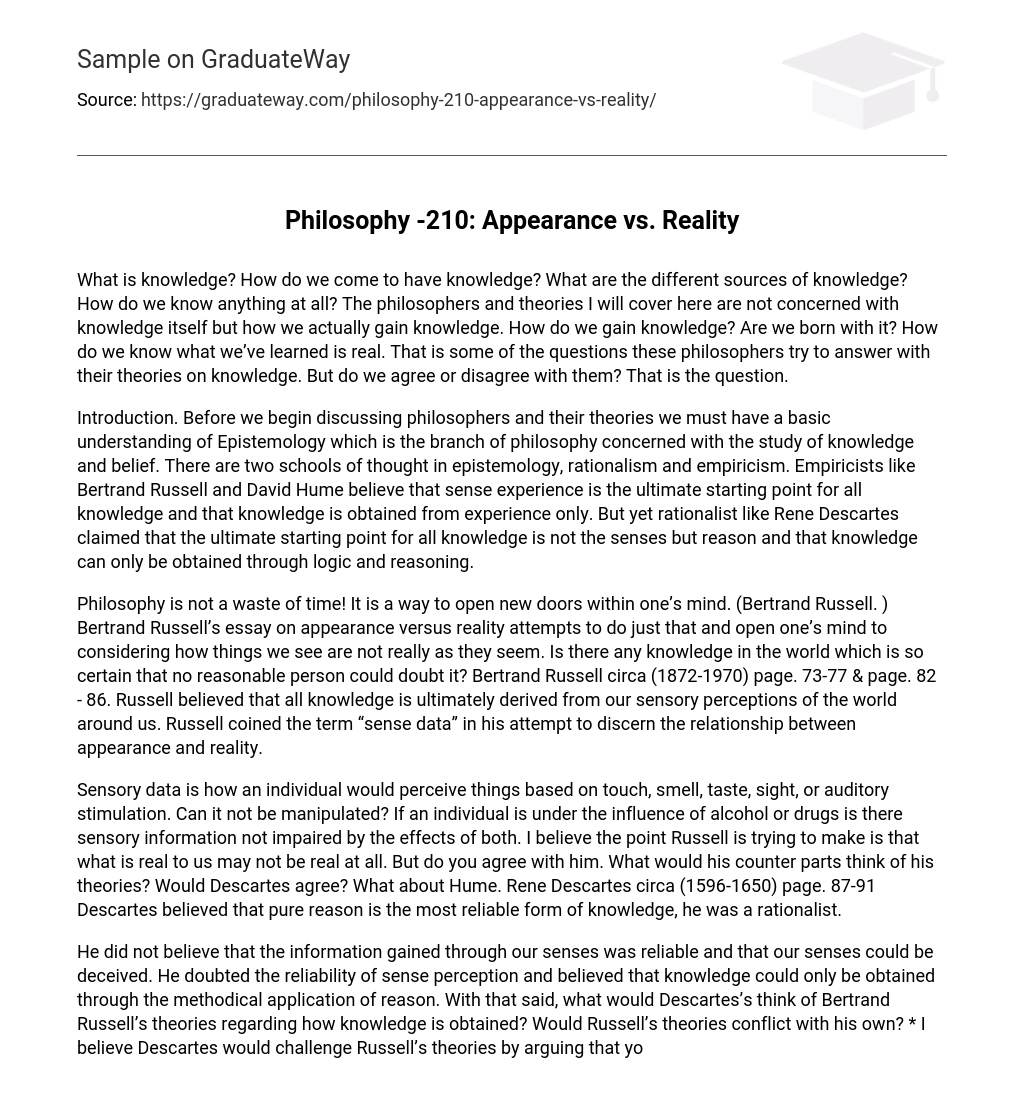What is the nature of knowledge and its acquisition? How do we obtain knowledge and can it be inherent? The philosophers and theories discussed here concentrate on the acquisition rather than the essence of knowledge. They aim to address these questions through their theories, but whether we agree or disagree with them remains a matter of dispute.
Introduction. Epistemology is a branch of philosophy that explores knowledge and belief. It is essential to have a grasp of this discipline before delving into philosophers and their theories. Epistemology can be categorized into two schools: rationalism and empiricism. Empiricists, such as Bertrand Russell and David Hume, assert that knowledge originates solely from direct experiences, highlighting the significance of sensory encounters. Conversely, rationalists like Rene Descartes argue that reason surpasses the senses in attaining knowledge; they advocate logic and reasoning as the primary means of acquiring knowledge.
In his essay on appearance versus reality, Bertrand Russell explores the significance of philosophy in expanding one’s mind and offering new perspectives. He challenges readers to question the accuracy of what we perceive, suggesting that things may not always be as they seem. Russell also raises doubts about whether any knowledge can be so certain as to entirely eliminate doubt from a reasonable person’s mind. From 1872 to 1970, he argued that all knowledge is rooted in our sensory perceptions and their interpretations. To delve into the relationship between appearance and reality, Russell introduces the notion of “sense data”. (Bertrand Russell, page 73-77 & page 82-86)
Sensory data is the perception of things through touch, smell, taste, sight, or auditory stimulation. It raises concerns about vulnerability to manipulation and impairment when influenced by alcohol or drugs. Russell argues that our perception of reality may be inaccurate. The text invites agreement or disagreement with Russell’s viewpoint and questions how his contemporaries, like Descartes and Hume, would respond to his theories. Descartes believed in pure reason as the most reliable form of knowledge, establishing him as a rationalist.
Descartes questioned the trustworthiness of sense perception and the precision of the knowledge acquired through our senses. He was convinced that our senses might deceive us and that genuine knowledge could only be attained by systematically employing reason. Given this perspective, if Descartes were to examine Bertrand Russell’s ideas on how knowledge is obtained, would they clash with his own convictions? In my view, Descartes would likely dispute Russell’s theories by asserting that one cannot depend solely on sensory information in order to acquire knowledge.
Descartes and Hume both had contrasting views on the role of sensory stimulation in learning. Descartes argued that sensory input during sleep undermines its reliability as a source of knowledge. He believed that certain aspects of reality are unchanging and cannot be interpreted or manipulated. Conversely, Hume posited that human knowledge is based on the connections between ideas, which he referred to as sense impressions. According to Hume, our understanding relies entirely on the evidence provided by our senses. Thus, anything lacking experiential validation is merely a fabrication and should be dismissed.
He believed that human reason or inquiry could be divided into two categories, relations of ideas and matter of fact. As with Russell, Hume was an empiricist. He was more concerned about what and how we know and not with what is actually the case. Although Hume and Russell differed in their philosophical theories I believe they would agree with one another to an extent.
Conclusion I can’t say I disagree with any one of the philosophers theories referenced in the text. In fact I personally believe that you have to apply all of their theories in order to gain knowledge.
While we gain knowledge through example and experience, there are certain elements that cannot be elucidated by logic and reasoning. A prime example of this phenomenon is the innate hunger observed in newborn babies, despite their lack of understanding. It is imperative to maintain an open mindset towards all types of learning and possibilities in order to acquire authentic knowledge.
References
The text features hyperlinks and references to multiple sources, including the Stanford Encyclopedia of Philosophy, “Exploring Philosophy: An Introductory Anthology” by Steven M. Cahn, the Internet Encyclopedia of Philosophy, and Online Research in Philosophy. These sources delve into the works of philosophers such as Bertrand Russell, David Hume, and Rene Descartes. By selecting the provided links, you can access webpages that offer further details on these philosophers.





